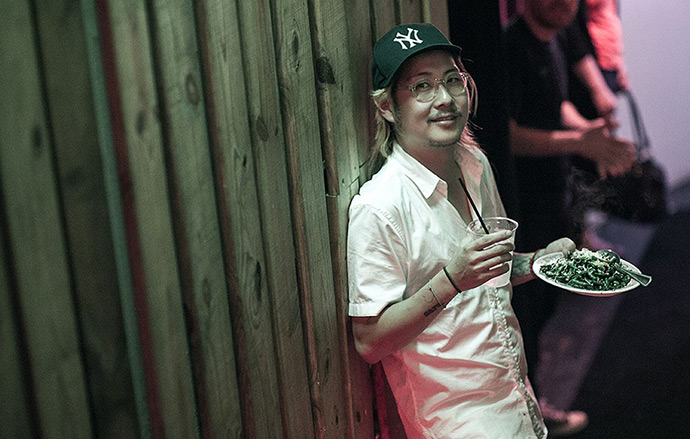
Now that the original Mission Chinese Food seems destined to endure as one of San Francisco's most popular spots, its chef and Rising Star award nominee, Danny Bowien, is about to introduce New Yorkers to his progressive Chinese-American cooking at a soon-to-open Lower East Side outpost. We phoned Bowien to talk about what he's putting on his new menu, his favorite Chinese restaurants in the city, and more.
--
JBF: We read the recent Bon Appétit piece about your trip to Chengdu, in China’s Sichuan province. Did you find any dishes there that you’re now adapting for your menu?
DB: There will be six or seven new dishes on our New York menu, and those things are definitely based on a lot of the flavor profiles that we found. We visited this chef who has a restaurant next to his house in the country; we made fresh tofu with him, and that went on to be the centerpiece of our meal, along with all these different side dishes. So, at the restaurant, we’re going to do fresh, warm tofu poached in soy milk, and serve it with some doubanjiang, chopped herbs, and pressed and pickled chrysanthemum leaves. Doubanjiang is fermented paste of sun-dried chilies and mung beans—it’s like the backbone of Sichuan cuisine. We also encountered a ton of offal while we were over there. We had the Sichuan version of chitlins—fried pork intestines—tossed with chilies. We’re doing a riff on that, too.
I guess one of the most important things I observed over there was how they cook with just the right number of ingredients, never adding extra things. Restraint is the hardest thing to practice in cooking, but they do that well.
JBF: Are you able to get your hands on all of the ingredients you’d like to use in your menu, or are some things out of reach?
DB: It can be a bit tough to find good quality Sichuan peppercorns: the ones you find in the States are often heat-treated or radiated. I went to a factory in China that showed me the real thing, so at least I know it when I find it here. In Sichuan I saw these lantern chilies that I had never seen before—you won’ find those here.
JBF: Do you have an ETA on when the new restaurant will be open? Do you know which charity you’ll be donating to?
DB: We’re definitely opening this month. We ran into some issues with the space that set us back a bit, but definitely this month. I’m also shopping around for a location in Brooklyn, which I’d like to open next year. I’d maybe like to open two more restaurants after that, then hopefully never open another restaurant again. It’s the most stressful thing I’ve ever done in my life. As for the charity, we’ll be donating to the Food Bank for New York City. We’re also going to have our bar program donate to rotating charities.
JBF: You recently moved to New York. Have you been checking out a lot of restaurants?
DB: I’ve been trying to go to as many Chinese restaurants as possible. They’re all kind of running together in my head, but there are a couple that stand out. I like East Corner Wonton in Chinatown; they do a great roast duck soup in very clean broth made with duck and chicken. I also like Henan Flavor on Forsyth Street; it’s named after the Henan province, whose food is more mild than Sichuan cuisine but still extremely delicious. They do a great dish of chicken that’s braised in beer and spices, fried, and then served with noodles and black vinegar. They also do great pancakes.
JBF: You grew up in Oklahoma. Are there any foods from that part of the country that you miss today?
DB: Barbecue for sure. I also miss all that food down there that’s bad for you, like chicken-fried steak with gravy. I miss a lot of my mom’s cooking. She was Polish and she made good stuffed cabbage. I even miss her Hamburger Helper.
JBF: What’s your earliest food memory?
DB: Cooking with my mom. I wasn’t one of those kids who played sports, so I would just go home after school and make dinner with her. We didn’t have a lot of money when I was growing up, so she cooked with mostly canned ingredients, but she made great stuff, like meatballs or tomato soup. I learned a lot about cooking from her.



-57 web.jpg)


